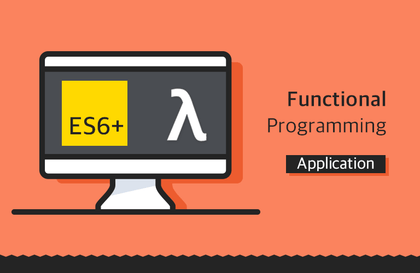
関数型プログラミングとJavaScript ES6+アプリケーション
mduniv
このコースは、関数型プログラミングとJavaScript ES6 +のシリーズコースで、さまざまなアプリケーションケースをカバーしています。
中級以上
JavaScript, Functional Programming
中上級開発者として成長するための高度なプログラミング言語活用能力と、関数型、オブジェクト指向、LISPパラダイムを組み合わせたソフトウェアの設計および実装能力を養います。
受講生 350名
難易度 中級以上
受講期間 無制限

学習した受講者のレビュー
5.0
끼룩쌔룩이
オブジェクト指向、命令型、イテレーター、関数型それぞれの理論と例を教えてくれる単純な講義ではありません。それぞれのパラダイムを視聴者が簡単に理解し、取り組みやすくなるように下地を整え、徐々に一つずつ合わさっていき、最後には「このように使えばいい」まで教えてくれる講義です。起承転結が完璧なドラマを見ているようでした。 この講義を見た人と見ていない人に分かれると思います。開発者なら、開発者になりたいなら、本当に楽しく視聴できると確信しています:)
5.0
지호손
本当に久しぶりに、単純な技術を習得して行う成長ではなく、プログラミングを行うソフトウェアを扱う人そのものとして成長できる経験をしました。学習を進める中で、毎瞬間インドンさんのインサイトに感嘆しながら、今まで自分で下してきたプログラミング関連の決定以外にも、他の選択肢がたくさんあることを確認できました。 当然のように活用してきた技術の根本的な設計意図を把握でき、より多くの選択肢を持つためには、複数のパラダイムをうまく混ぜて、適材適所に活用できる能力を身につける必要があります。その成長はこれから始まるのではないかと思います。そのようなスタートを切るには良い講義だと思います。 他の同僚の開発者もこの講義を通して、マルチパラダイムプログラミングを完全に共感し、楽しめることを願っています。
5.0
devsn
「マルチ」パラダイムを学べる講義。 長年にわたり様々な言語やフレームワークを扱ってきましたが、今回の講義ほどパラダイム自体に重点を置いて、プログラミングを扱った経験は本当に久しぶりな気がします。数年前に関数型プログラミングを学習していた時を思い出しますね。 オブジェクト指向/関数型/命令型を行き来しながら説明する方式は非常に印象的でした。イテレータパターンについて構造的思惟をすることができ、実質的な活用法を共に学ぶことができたので有益な時間でした。 言語学習ではなく、プログラミング言語がどのように思考を拡張させるのかを経験することができました。 現在、自分のコーディング方式に新たな転換点を置きたい方々に強くお勧めします。
高級プログラミング言語活用
型システム
関数型プログラミング
オブジェクト指向プログラミング
リスト処理
マルチパラダイムプログラミング
学習対象は
誰でしょう?
確かな基礎力を身につけたい開発者
中級開発者
フロントエンド開発者
TypeScript を使用するバックエンドエンジニア
マルチパラダイム言語の基礎と活用を学びたい Kotlin/Java/Swift 開発者
前提知識、
必要でしょうか?
現代プログラミング言語基本文法
TypeScript 基本文法
22,749
受講生
798
受講レビュー
457
回答
4.9
講座評価
5
講座
マープルコーポレーション CTO
元カカオ、NCソフト Openmaru Studio 開発者
Marpple開発大学 YouTubeチャンネル、オンラインコミュニティ
オブジェクト指向FEライブラリRune開発
関数型ライブラリFxTSの設計に参画
関数型ライブラリFxJS開発
関数型データベースクエリビルダーFxSQL開発
関数型DOM操作ライブラリFxJS-DOM開発
関数型JavaScript Facebookグループ 運営
ネイバー、ネクソン、カカオの開発者向け技術教育、企業出講
多数のオン・オフライン講義
全体
48件 ∙ (5時間 15分)
全体
30件
5.0
30件の受講レビュー
受講レビュー 16
∙
平均評価 5.0
5
本当に久しぶりに、単純な技術を習得して行う成長ではなく、プログラミングを行うソフトウェアを扱う人そのものとして成長できる経験をしました。学習を進める中で、毎瞬間インドンさんのインサイトに感嘆しながら、今まで自分で下してきたプログラミング関連の決定以外にも、他の選択肢がたくさんあることを確認できました。 当然のように活用してきた技術の根本的な設計意図を把握でき、より多くの選択肢を持つためには、複数のパラダイムをうまく混ぜて、適材適所に活用できる能力を身につける必要があります。その成長はこれから始まるのではないかと思います。そのようなスタートを切るには良い講義だと思います。 他の同僚の開発者もこの講義を通して、マルチパラダイムプログラミングを完全に共感し、楽しめることを願っています。
「ソフトウェアを扱う人そのものの成長」は、本当に素敵な表現であり視点ですね。講義を通じて伝えたい話が伝わるようで嬉しいです。これからもジホさんがソフトウェアエンジニアリング分野で素晴らしく、楽しいことでいっぱいになるよう願っています!
受講レビュー 3
∙
平均評価 4.3
5
「マルチ」パラダイムを学べる講義。 長年にわたり様々な言語やフレームワークを扱ってきましたが、今回の講義ほどパラダイム自体に重点を置いて、プログラミングを扱った経験は本当に久しぶりな気がします。数年前に関数型プログラミングを学習していた時を思い出しますね。 オブジェクト指向/関数型/命令型を行き来しながら説明する方式は非常に印象的でした。イテレータパターンについて構造的思惟をすることができ、実質的な活用法を共に学ぶことができたので有益な時間でした。 言語学習ではなく、プログラミング言語がどのように思考を拡張させるのかを経験することができました。 現在、自分のコーディング方式に新たな転換点を置きたい方々に強くお勧めします。
繰り返し、そして多様な巡回戦略をイテレーターという値(オブジェクト)でカプセル化して扱い、一つの繰り返し文の中でも様々なパラダイムに転換できるように発展してきた現代言語の設計は、本当に素晴らしいと思います。ありがとうございます。:)
受講レビュー 1
∙
平均評価 5.0
5
9年間の開発経験を持つ開発者として、私はオブジェクト指向、関数型、手続き型など多様なプログラミングパラダイムを使ってきましたが、各パラダイムの違いや活用を十分に活かしきれていないと感じていました。 初めて開発者カンファレンスでインドンさんの発表に感銘を受け、Inflearnの関数型プログラミング講義とYouTubeを通じてより多くの内容に触れ、今回新たに発売されたマルチパラダイム講義は、単に特定の開発スタイルや方式についての話ではありませんでした。パラダイムに対する見方そのものを変化させてくれました。特に、遅延評価(lazy evaluation)、iterable、iterator、generatorのような概念を、理論だけでなく実際の活用という観点からより深く理解することができ、これらの概念を実務にどう適用できるか具体的に考えるきっかけになりました。 毎日慣れたパターンで開発し、思考方式が凝り固まっていたのですが、この講義は新しい観点からコードを見てみようと思わせてくれました。 これからは会社のチームメンバーとマルチパラダイムプログラミングについて共有し、私たちの実際の業務コードにどう適用し改善できるか話し合ってみたいと思います。🔥 part-1からpart-7まで続くという講義計画を聞き、これから出てくる深化内容と応用事例も本当に楽しみです。👍
ご受講いただきありがとうございます。チームの皆様と適用までお考えとは、素晴らしいですね。きっとお役に立てると信じています:) 私も良いコンテンツでお手伝いさせていただきます!一緒に頑張りましょう!
受講レビュー 1
∙
平均評価 5.0
5
本編の講義では、Iteration Protocol(イテレーションプロトコル)を集中的に扱います。命令型、オブジェクト指向、関数型パラダイムを行き来しながら、さまざまな実装方式でプロトコルを実装し、動作原理を探求します。また、多様な言語がそれぞれの方法でイテレーションを定義し、活用する方法を通じて、多様な視点と洞察を伝えます。 学習を通じて、イテレーションプロトコルが特定の言語やパラダイムに縛られない共通の規約であることを理解できます。このような特徴のおかげで、多様なパラダイムを活用しながらも、互いに調和するマルチパラダイムプログラミングが可能になります。 イテレーションプロトコルは、マルチパラダイムという特徴の他に、演算やメモリ効率にも役立ち、ラムダ式による便利な型推論も可能になるなど、機能的な利点もあるため、それ自体が十分に魅力的な概念です。主に使用する言語がジェネリックをサポートしている限り、どこにでも適用できるため、活用度も非常に高く、学習する価値があると思います。 OOPに慣れている方はもちろん、FPを扱ってきた方でも、講義で説明するイテレーションの特徴を探求していくうちに、きっと新しい視点を身につけることができると思います。
詳細なレビューありがとうございます!講義をとても詳細に学習してくださったようですね。おっしゃる通り、ほとんどの現代言語に適用できる概念です!楽しいプログラミングの旅になりますように!ありがとうございます:)
受講レビュー 5
∙
平均評価 4.8
修正済み
5
様々な要素を組み合わせて自分だけの言葉で昇華させた達人の講義でした。私はこの内容をより数学的な言語であるIterable Functor -> Fx Monadと理解していましたが、より実務的な形で解き明かしてくれたのが良かったです。そして、著者が説明するlist processingは数学的にはadjoint functorを用いて理解する枠組みがあるのですが、コード(意味) < - > データ (意味なし) を混同しうると強調したのも非常に良いです。ただ個人的には、ほぼすべての説明が関数型パラダイムに基づいているようで、マルチパラダイムだと見るのは少し難しかったです。実務と理論がうまく組み合わされた講師の能力に刺激を受けます。ありがとうございます。 全講義修了しました!良いですね!
ご受講、そして素敵なレビューを誠にありがとうございます。:) 1編ではマルチパラダイムの交差点の一つであるイテレータについて扱った後、1編にはない内容である本書の4,5,6,7章へと進むにつれて、マルチパラダイム的な内容が高度化されます。 多くのご関心をお願いいたします。:)
¥6,805
知識共有者の他の講座を見てみましょう!
同じ分野の他の講座を見てみましょう!